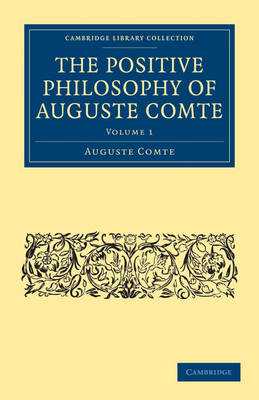Cambridge Library Collection - Science and Religion
1 primary work • 2 total works
Volume 2
This is a free translation and abridgement of Comte's greatest and monumental work, "Cours de philosophie positive" (1830-42). It is a work that inaugurates the history of science and the new science of sociology. Comte's philosophy emerged from his study of the progress of the European mind, based on mathematics, astronomy, physics, chemistry and biology. Besides France, his work was particularly influential in England through John Stuart Mill's great interest.
The Positive Philosophy of Auguste Comte 2 Volume Paperback Set
by Auguste Comte
Published 24 September 2009
The Positive Philosophy of Auguste Comte is a condensed English version of the French philosopher's controversial work, freely translated by Harriet Martineau and published in two volumes in 1853. Martineau's abridged and more easily digestible version of Comte's work was intended to be readily accessible to a wide general readership, particularly those she felt to be morally and intellectually adrift, and Comte's philosophy indeed attracted a significant following in Britain in the later nineteenth century. Comte's 'doctrine' promoted personal and public ethics and social cohesion based no longer on metaphysics but on strict scientific method, and anticipated twentieth-century logical positivism and secular humanism. Volume 1 covers mathematics and science, while Volume 2 presents Comte's new science of 'social physics' and outlines his theories about society and human progress.

